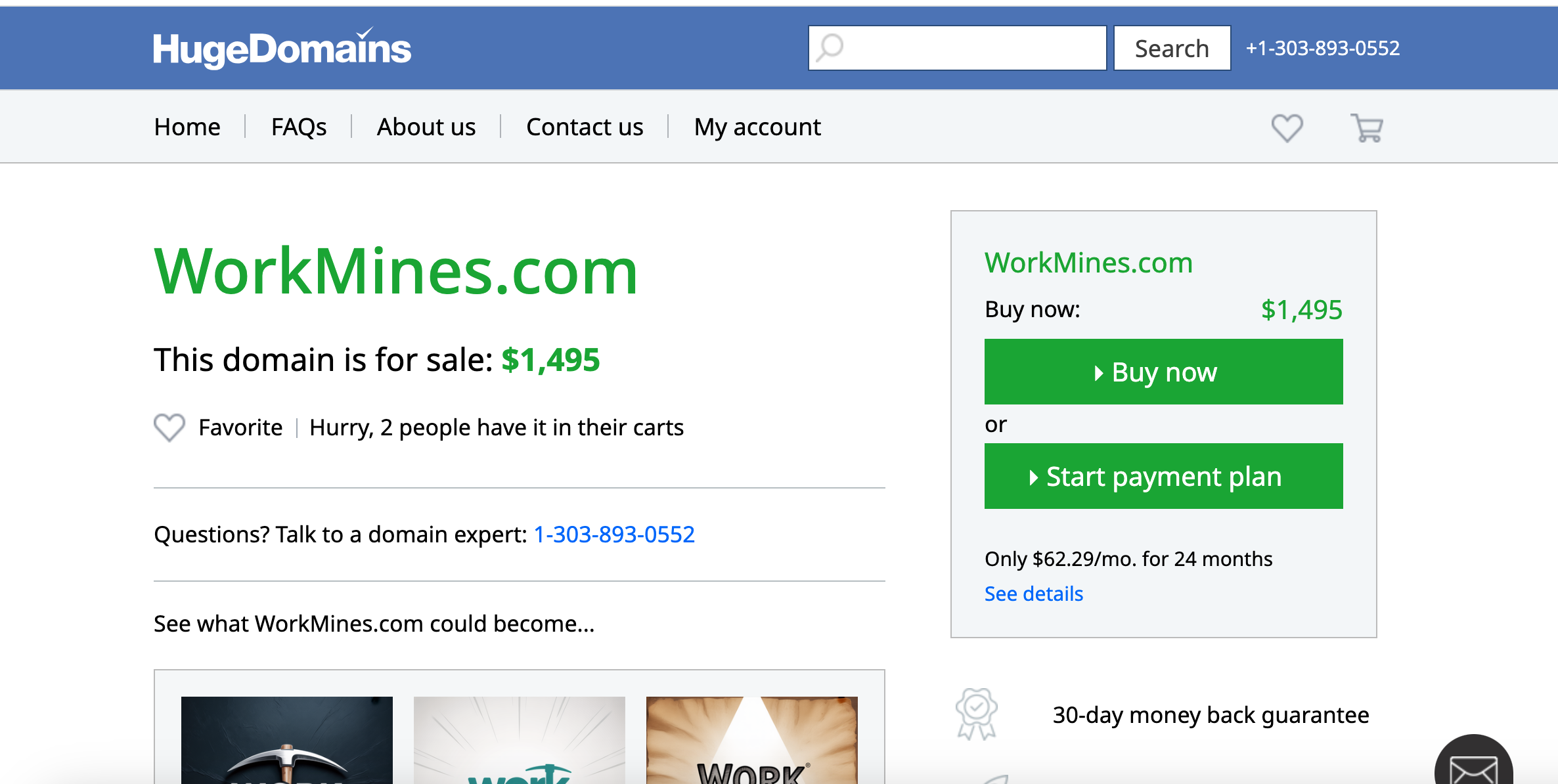WorkMines.com Scam Review: Alleged Scam Risks
In the evolving digital economy, platforms that promise easy income or passive rewards draw attention fast — and not always for positive reasons. One such platform attracting significant concern is WorkMines.com. Though it bills itself as an opportunity to “earn” through simple tasks or mining-like mechanisms, a growing number of users and observers warn that WorkMines exhibits multiple traits consistent with fraudulent or unsustainable business models. This investigation explores how WorkMines operates, what people are warning about, and whether it’s a risk worth taking seriously.
What Is WorkMines Claiming to Be?
WorkMines describes itself as a “mining” or task-based platform that enables users to earn by completing micro-jobs, viewing ads, or performing small digital tasks. The concept appears simple and attractive: contribute small amounts of effort, and receive rewards or “mined” digital tokens in return. For people looking for side income or low-effort opportunities, this pitch can be very appealing.
The platform also features what it calls a wallet system — users store their earned credits in the WorkMines account wallet, with a promise that they can withdraw or convert these credits into real money (though the exact payout mechanism is often vague or under-specified).
Importantly, WorkMines markets itself with a slick, professional look, giving the impression of a sophisticated, legitimate enterprise. But a closer look reveals a number of red flags that make many people question the real purpose behind the platform.
Red Flags & Reported Concerns
1. Unclear Revenue Model & Value Creation
One fundamental problem reported by watchers is the lack of transparency around how WorkMines generates revenue. If users are earning credits or tokens, who is paying for those? The platform does not clearly explain its business model:
-
Does WorkMines rely on massive ad revenue to fund payouts?
-
Are companies actually sponsoring the paid tasks?
-
Is there a real underlying “mining” economy, or is this simply a façade for paying out from new users’ contributions?
Without a clear and credible revenue generation model, it’s hard to know whether the “earn” side is sustainable or whether the credits users accumulate are meaningful or liquid.
2. Opaque Wallet and Withdrawal Mechanics
The platform’s “wallet” functionality is another point of concern. While WorkMines claims that users can store earnings in a wallet and eventually withdraw or cash out, many users find the terms confusing or obfuscated. User reports indicate the following:
-
Difficulty understanding the minimum withdrawal threshold.
-
No clarity on what “wallet balance” actually represents: is it cash-equivalent credit, or mere points within the WorkMines system?
-
Lack of clear, verifiable history of successful payouts: users claim they never saw withdrawals hit their bank or payment account after requesting them.
When a platform makes it hard to translate “wallet credit” into real, usable money — or when the process is shrouded in confusion — that’s a serious red flag.
3. No Verifiable Proof of Task Payouts
Though WorkMines encourages completing small tasks or viewing ads, the actual experience by users is inconsistent. Several people claim that tasks do not always credit correctly, or that after spending time doing them, the earnings added to their wallet are very low or even zero. This discrepancy raises concerns about whether the tasks are real, whether the payments are genuine, and whether some tasks might be “fake” activity designed only to simulate work without real payout.
For a business predicated on user effort, failing to generate consistent, credible compensation is a fundamental issue.
4. Difficulty or Delays in Cashing Out
One of the most serious practical concerns is users’ ability (or inability) to cash out funds. Many platforms that promise “earn while you work” fall apart at this crucial stage — when the earned credits are supposed to become real money. Reports from users indicate:
-
Cash-out requests take an unusually long time to process (if at all).
-
The actual payout amounts — after withdrawn — are often much lower than expected based on the wallet balance.
-
Some users stop receiving replies or support after they try to make a withdrawal.
If WorkMines is indeed making it hard or impossible for users to get real money out of their wallet credit, it raises the possibility that the platform functions more to collect labor (or user engagement) than to provide meaningful, reliable earnings.
5. Questionable Business Transparency
Another concern critics highlight is the lack of meaningful corporate disclosure: who is behind WorkMines? Where does the platform operate from? What is its legal structure? How does it handle taxes, payments, and compliance? Reliable earning platforms typically provide transparent business information, clearly explain how funds are handled, and offer contact details or legal terms. WorkMines does not seem to do this effectively, leaving users in the dark about the company’s legitimacy.
When a business does not make its structure, financial terms, or relationships with payment partners clear to users, trust is severely undermined.
6. High Risk of Violation or Abuse
Because the model depends on users completing tasks — often low-paying ones — there is a risk that the platform is exploiting free labor. If payouts are not reliable or if many users never reach the threshold for cash-out, WorkMines might operate in a way that benefits the platform far more than the individuals doing the tasks. This dynamic could be akin to a digital sweatshop where user actions produce value, but the payout side is artificially constrained or under-delivered.
Additionally, platforms like this risk attracting fraudulent behavior: accounts created solely to game the system, low-quality or spammy tasks, and other abuses could undermine the real value of the system.
Risk Comparison: How WorkMines Might Fit Into Known Scam Models
The concerns around WorkMines do not exist in isolation; in fact, they map closely to known patterns in online labor-scam or “get-paid-to” schemes. Several well-known scam structures overlap with what WorkMines reportedly does:
-
GPT (“Get Paid To”) Scams: These platforms empower users to perform trivial tasks (like watching ads or clicking links), but often pay little or nothing, or delay payouts indefinitely.
-
Fake Mining Platforms: Some sites call themselves “mining” platforms without actually mining anything. Users “earn” credits, but those credits may not have real-world value or a real conversion mechanism.
-
Ad Scams: Platforms pretending to pay users for ad views, but using the system to generate revenue for themselves while limiting how much they actually pay in return.
-
Exploitative Microtasks: Asking people to do low-value jobs for very modest pay, but making cash-out terms onerous or effectively unreachable for many.
WorkMines, according to user reports, seems to touch on all of these. That convergence suggests the risk of the platform behaving more like a trap for user time than a fair earning opportunity.
Risk Profile: Who Might Be Most Affected
-
Low-income or seeker users: People looking for side income, or those drawn in by the promise of “easy money,” may be most vulnerable.
-
Uninformed newcomers: Those unfamiliar with micro-task platforms may not realize how difficult it can be to convert credits into real money.
-
High-commitment users: People investing significant time into tasks may find their effort under-rewarded or underpaid if withdrawals don’t actually materialize.
-
Casual task-workers: Users who perform tasks sporadically may never reach payout thresholds or may find the cost of topping up minimally viable for real cash-out.
Final Assessment: Is WorkMines.com a Scam?
Based on the weight of reported issues — opaque payout mechanisms, confusing wallet structure, unclear corporate accountability, and withdrawal trouble — WorkMines.com demonstrates many of the hallmarks of a high-risk or potentially fraudulent earning platform.
While there is not necessarily a public criminal judgment against it, the combination of:
-
No clear, credible explanation of how earnings are funded
-
Inconsistent or missing user payouts
-
Difficulties converting “wallet credits” to real money
-
Lack of legal or business transparency
all suggest a system potentially built more for extracting user effort (or engagement) than for delivering meaningful rewards.
There is a real possibility that users may spend a great deal of time chasing minimal or unreliable compensation — and there is a risk that the promised cash-out mechanism may not be fully credible or functional for many.
In short: WorkMines may not be a “scam” in the legal mix (depending on jurisdiction), but the risk profile is unacceptably high for those seeking a reliable, trustworthy platform to earn money. Anyone using WorkMines should proceed with deep skepticism and a clear understanding that their time might not be converted into meaningful earnings.
-
Report WorkMines.com and Recover Your Funds
If you have fallen victim to WorkMines.com and lost money, it is crucial to take immediate action. We recommend Report the scam to BOREOAKLTD.COM , a reputable platform dedicated to assisting victims in recovering their stolen funds. The sooner you act, the greater your chances of reclaiming your money and holding these fraudsters accountable.
Scam brokers like WorkMines.com persistently target unsuspecting investors. To safeguard yourself and others from financial fraud, stay informed, avoid unregulated platforms, and report scams to protect. Your vigilance can make a difference in the fight against financial deception.





